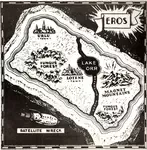- Home
- Your Views
- Part Nine of The Archives of the Moon
Part Nine of The Archives of the Moon
by Robert Gibson
(Lancashire, England)
IX
All eyes turned to a space near the wall opposite the throne, where a strange captive creature rested its distended bulk upon a massive wicker pedestal.
The vrell was a filmy, hydrous globe about seven yards in diameter, with octuple cancroid antlers or limbs growing from its summit. In appearance it seemed as vulnerable as a bloated dew-drop, and indeed it was so heavy that it could not move itself even under the light gravity of Yyu; nevertheless it possessed a toughness unequalled by any of the native denizens of either Yyu or of Urom. With its brethren it had originated on some far clump of asteroids, and over the ages the vrells had scattered across space, some falling upon Yyu, some upon Urom and some, doubtless, upon other worlds.
Vrells were few in number, and did not reproduce; the lifetime of an individual was coterminate with the lifetime of the species. Their rarity and uniqueness extended to the quality of their mental life: their minds, if they had minds, were inaccessible to the Yyr. And yet, by accident, something extremely useful had been discovered about them: they could be used for long-distance communication. Each vrell existed in some kind of telepathic contact, or perhaps merely a synchronous subetheric resonance, with at least one other vrell. And the way in which this force worked was such as to provide the owners of these creatures with something of a telephone service.
Now in the throne-room of Atth the vrell’s argentiferous skin became tinted with a pink flush of auditory ignition, and the voice of Pihinxin, King of Palabaraz, spoke from across the breadth of Yyu:
“Have you returned home, O Vaphru? I require you to answer.”
Vaphru spoke back, briefly and simply. And her words entered the vrell and issued forth from the other vrell almost three thousand miles away in the palace of Pihinxin: “Yes, I am here.”
Pihinxin questioned her further:
“Why did you turn back, why did you not complete your journey to Palabaraz, why have you thus disturbed the arrangements which I have made for your nuptials with Zdrarph?”
The young Queen of Atth was silent at the words of her guardian and overlord, for never before had she defied his sagacity and power – the prestige by which he had gained influence over Atth during her minority.
Before she could formulate an answer, Dzhaoo, her consort, deemed this as good a moment as any to assert his own status. Speaking at the vrell, he declared:
“The nuptials of Vaphru are completed, and she has become of age. We invite you, O Pihinxin, to visit us, to celebrate this felicitous occasion.”
“Whose voice is that?” demanded the portentous voice from the vrell.
“Dzhaoo, King-Consort of Atth.”
The silence of dumbfoundment reigned for some moments over the ether-link from city to city.
The fact that the Queen of Atth had acted independently was outrageous enough; but to hear her Consort speak with a recognizable commoner’s voice put the matter beyond the pale of what was endurable...
Pihinxin finally demanded: “Is this true, O Vaphru?”
“It is.”
“Then,” said the Palabarazan, “you and your city are forfeit to me. What is done cannot be nullified; no terms will be offered; my swarm and those of my allies will compel Atth to unconditional surrender.”
The words of doom echoed in the cavernous central chamber of Atth. The vrell lost its roseate sheen and returned to quiescence.
The threat of destruction – for such it was, since the Atthans’ collective civic consciousness preferred annihilation to surrender – was transmitted all over the city, spreading a wave of shock which was followed by a fatalistic sentiment of obedient fortitude on the part of the common people. Those lowly beings comprehended the situation to the limited extent required of their status; their nerves suffered twinges of sorrowful dread as they awaited orders from their rulers, who felt keener emotions: the barbs of conscience, of acuter awareness. Dzhaoo in particular too upon himself the agonizing responsibility for what had occurred.
Vaphru in a sense concurred with this condemnation, by entrusting him with the defence of the realm. “I have risked all for you,” she told him; “I will therefore trust you to the last.”
News soon came that the swarms led by Pihinxin were on the wing. Virtually an entire hemisphere had gathered in enmity to Atth. Dzhaoo, hardening his heart against the lancinating pangs of remorse, reminded himself that he had known what would happen, and that he was in the right. He sent messages to neutral swarms, warning them of the global designs of Pihinxin, and entreating the as-yet-uncommitted rulers to band together with Atth to preserve their liberty before it was too late. All these emissaries were unsuccessful.
Time was running out, the attack was closing in, and Dzhaoo was finally impelled to take a step which he had anticipated with hesitancy and dread.
He took sole possession of the throne-room, dismissing all the courtiers and attendants, while Vaphru was elsewhere occupied with the inspection of the city’s fortifications.
As soon as he was quite alone except for the vrell, he faced that globular being, and sprayed it with a special concoction which served to ignite the creature’s resonance with a vrell upon the surface of Urom.





























